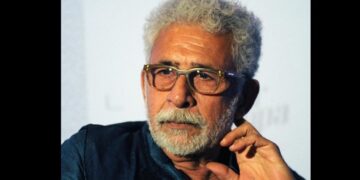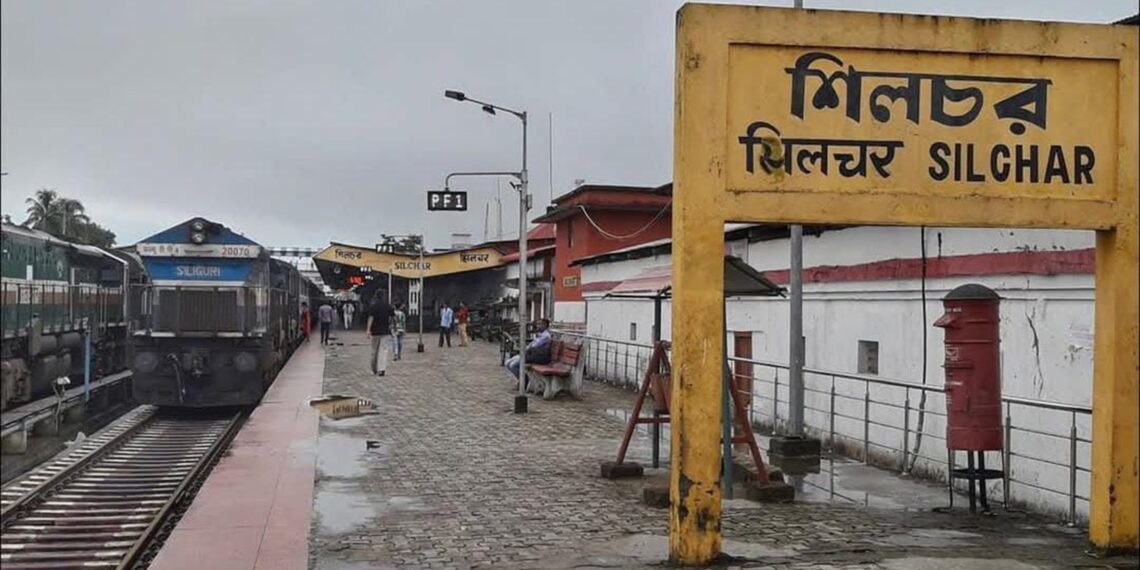The attitude of the state government toward renaming Silchar Railway Station as “Bhasha Shahid Station” (Language Martyrs’ Station) has always been negative.
Otherwise, even after the Union Home Ministry and the Railway Ministry approved the renaming, the process remains stalled solely due to the state government’s reluctance.
The Chief Minister publicly claimed that the state government has already given its NOC. But there is no question of issuing an NOC here.
In 2015, the Centre wrote to the state government asking it to confirm the spelling of the name “Bhasha Shahid Station, Silchar” and send it back for final approval.
The state government has not responded to that letter to this day. Hence, it is natural that questions arise about the government’s intent.
Although the demand to rename Silchar Railway Station as “Bhasha Shahid Station” is long-standing, various tactics are being used to prevent it from being realised.
Recently, Mukteswar Kemprai, president of the Dimasa Writers’ Forum, allegedly described the 1961 language movement activists as “Bangladeshis.”
It is alleged because his statements seem to echo the state government’s tone.
Perhaps he is unaware that in the 1961 language movement, besides Bengalis, Manipuris, Dimasas, and members of the tea garden communities also actively participated.
Such an insensitive remark on this emotional issue will undoubtedly create widespread resentment among the people of Barak Valley.
However, the Dimasa Sahitya Parishad has refuted Kemprai’s claim, clarifying that the naming of the Language Martyrs’ Station does not benefit or harm any particular linguistic community.
Their statement explicitly acknowledges that the Dimasa community had supported the 1961 movement.
The renaming of Silchar Railway Station as “Bhasha Shahid Station” has nothing to do with linguistic gain or loss; rather, it would be the rightful recognition of the eleven innocent individuals who were martyred in defense of their linguistic rights.
Recently, the central president of the Asam Sahitya Sabha, Basanta Kumar Goswami, personally took the initiative and wrote to Chief Minister Himanta Biswa Sarma in support of the renaming.
After his letter, the sudden emergence of an organization called “Dimasa Writers’ Forum” seems suspicious. It is not hard to guess who is pulling the strings behind this group.
Clearly, the primary goal of the state government is to block the renaming of the station by any means necessary.
The ruling party members of Barak Valley cannot deny this reality, though they hesitate to speak out for political reasons.
A delegation of the Asam Sahitya Sabha has supported the demand to rename Silchar Railway Station as “Bhasha Shahid Station.” After laying floral tributes at the Shahid Bedi (Martyrs’ Memorial), President Basanta Kumar Goswami stated that he would speak with the state government to ensure the demand is fulfilled.
His positive stance is truly inspiring. In line with his promise, he has written to the Chief Minister and attached copies of the approval letters from the Union Home Ministry and the Railway Ministry.
However, the Chief Minister publicly declared that the NOC had already been sent earlier.
The inconsistency between words and actions raises serious doubts.
The state government’s behavior clearly reflects its unwillingness to value the emotions of the people of Barak Valley.
While the Asam Sahitya Sabha—a widely respected organisation—has been working positively to bridge the emotional gap between the Brahmaputra and Barak Valleys, the state government remains unmoved.
It is difficult to understand what kind of political gain the government seeks by keeping this issue unresolved.
On 19 May 1961, eleven brave sons of Barak Valley were martyred at Silchar Railway Station while peacefully fighting for their right to use their mother tongue.
They were unarmed civilians—students, laborers—guided by the ideals of non-violence.
Among them was sixteen-year-old schoolgirl Kamala Bhattacharya, India’s first female language martyr.
These martyrs were not rebelling against any community or administration, but were defending the constitutional right to linguistic identity enshrined in Article 29 of the Indian Constitution.
Their sacrifice made Barak Valley the only region in independent India where people gave their lives for the right to their mother tongue.
Their movement was democratic, non-violent, and Gandhian. To label such a movement as communal or narrow-minded is an insult to the very spirit of India’s democracy and freedom.
The movement was not solely for the Bengali language; it was for the right of every linguistic group in Barak to preserve their mother tongue.
Hence, people from all communities actively took part. In protest against the police firing on unarmed civilians, Nandakishore Sinha, the Bishnupuriya Manipuri MLA from the Sonai constituency, even resigned from the Assam Legislative Assembly.
This shows the movement was not about one linguistic group but against the imposition of a one-language policy by the state government.
Therefore, the proposal to rename Silchar Railway Station as “Silchar Bhasha Shahid Station” is not a symbol of regionalism or linguistic dominance—it is a symbol of justice and gratitude toward the martyrs.
Just as India proudly names airports, roads, and institutions after Netaji Subhas Chandra Bose, Shaheed Bhagat Singh, and Mahatma Gandhi, Silchar too deserves to honour its martyrs who upheld the spirit of the Constitution through peaceful sacrifice.
The station where eleven innocent lives were lost is not just a railway station—it is a monument to linguistic democracy, a sacred ground worthy of national heritage status.
Just as Jallianwala Bagh reminds us of colonial brutality, Silchar Railway Station stands as a sacred memorial to linguistic justice in independent India.
The name “Silchar Bhasha Shahid Station” carries no narrow political motive; it represents linguistic freedom, democratic rights, and unity in diversity.
It diminishes no community—Dimasa, Assamese, or any other—but celebrates the long history of coexistence and harmony among the Barak Valley’s many communities.
The Bengali language is not foreign to Barak Valley; it is an inseparable part of this land’s cultural and administrative heritage.
In the sixteenth century, when the Dimasa Kachari kings established their capital at Maibang, a 1576 stone inscription found there was written in the Bengali script.
All royal documents—laws, fines, land records, and agreements—were maintained in Bengali.
Thus, Bengali was not merely a spoken language but also the language of law, administration, and civilization in this region long before modern Assam came into being.
The Dimasa kings had invited Bengalis from the Samatata region for administrative and religious purposes, leading to a deep spiritual and cultural connection between the Dimasa and Bengali communities that continues even today.
Therefore, any attempt to pit these two communities against each other for political gain will not succeed.
A few individuals might make irresponsible remarks out of emotion, but creating large-scale discord among communities will not be easy.
Earlier, another group demanded that the station be named after Veer Sambhudhan Phonglo.
People of Barak Valley deeply respect Phonglo, who heroically fought against British colonial rule in 1883. His contribution is part of India’s glorious freedom struggle.
But using his name to overshadow the memory of the 1961 language martyrs is unacceptable.
Both struggles are sacred—one against foreign rule, and the other against administrative injustice in democratic India—but they cannot be compared.
Naming something else after Veer Sambhudhan Phonglo would be fitting, but naming the railway station after the language martyrs is the most justified step, as it harms no one.
The Assam government has still not officially recognized the 1961 language movement activists as “Language Martyrs.”
The report of the Mehrotra Commission, formed to investigate the police firing at Silchar Railway Station that year, has not yet been made public.
The reason is clear—if published, the report would expose the state government’s negligence.
Instead, during the current regime, Minister Chandramohan Patowary stated in the Legislative Assembly that those killed in the 1961 police firing were “miscreants.”
This reveals the government’s true mindset. To label innocent victims of state oppression as criminals is a disgraceful act.
Like previous governments, the current one also shows reluctance to recognize the martyrs. Whenever the renaming proposal comes up, the government finds excuses to block it.
In the past, objections were raised in the name of fictitious organisations to create complications and delay the process.
However, according to rules, anyone from outside the concerned area cannot raise objections.
If the overwhelming majority of the local population supports the demand, dismissing it would be considered undemocratic and unethical.
The current state government seems unwilling to follow such principles. The rulers say one thing and do another.
Otherwise, the people of the state would not have witnessed the disgraceful incident of a minister calling the 1961 martyrs “miscreants.”
The growing tendency to deny Barak Valley’s history and heritage is not a positive sign. Ignoring the people’s rightful demands for political convenience can never yield good results.
Political power is never permanent—this truth should be remembered by the current rulers.
Sooner or later, the ruling party will have to pay the price for repeatedly suppressing the simple, legitimate aspirations of the people of Barak Valley.
(The opinions expressed are personal. The author is a former student leader and a lawyer at the Gauhati High Court.)















